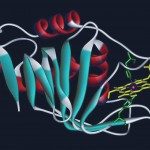Link to Pubmed [PMID] – 15213429
J. Biomol. NMR 2004 Jul;29(3):309-18
The effect of hydrogen/deuterium exchange on protein hydrogen bond coupling constants (h3)J(NC’) has been investigated in the small globular protein ubiquitin. The couplings across deuterated or protonated hydrogen bonds were measured by a long-range quantitative HA(CACO)NCO experiment. The analysis is combined with a determination of the H(N)/D(N) isotope effect on the amide group (1)J(NC’) couplings and the (15)N and (13)C’ chemical shifts. On average, H-bond deuteration exchange weakens (h3)J(NC’) and strengthens (1)J(NC’) couplings. A correlation is found between the size of the (15)N isotope shift, the (15)N chemical shift, and the (h3)J(NC’) coupling constants. The data are consistent with a reduction of donor-acceptor overlap as expected from the classical Ubbelohde effect and the common understanding that H(N)/D(N) exchange leads to a shortening of the N-hydron bond length.

